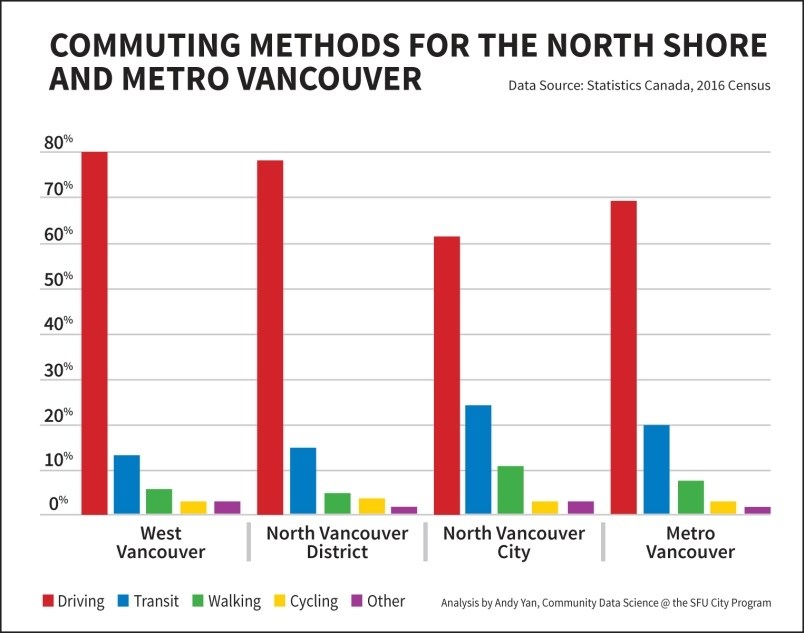The Ministry of Transportation and Infrastructure has flagged the District of North Vancouver, raising concern about the pace of development.
The sentiments were spelled out in a series of letters from the ministry to district staff sent during the rezoning processes for a 150-unit townhouse project in Lions Gate and for the 411-unit Emery Village redevelopment in Lynn Valley.
Kelly Bond, who with her fellow Emery Village renters is set to be demovicted in April, came by the letters via a Freedom of Information request she filed while informing herself about the development process.
“Please note the ministry has ongoing concerns with the volume of new developments in the District of North Vancouver. Although the above individual development does not warrant a traffic impact study for the ministry, moving forward, the ministry recommends the district arrange for further road network studies to better understand where road network improvements may be required in the future,” a letter related to the Lions Gate townhouse project stated in June.
Another letter relating to the Lynn Valley project sent in July repeats the concern.
“The ministry has concerns with the overall number of new developments in the District of North Vancouver,” it stated.
Bond did not get access to the letters until late October – several months after the previous district council voted to rezone Emery Village.
Bond said she is now left to wonder whether all of council was fully informed of the ministry’s concerns at the time of the vote.
“They shouldn’t just be informed of the final approval. They should get to read these,” Bond said. “The bulk of the population here has been saying ‘I think we need to get some improvements in infrastructure before we keep building buildings so if the higher authority has that same feeling, then maybe the citizens have something there.”
In an interview, Dave Stuart, chief administrative officer for the district, said both projects received unconditional approval from the ministry, but he added that district staff are somewhat baffled by being singled out by a ministry bureaucrat.
“We regularly meet with transportation staff on a wide variety of transportation plans and projects. We’re almost meeting weekly. Our development in the district is based on our OCP (official community plan), which we shared with TransLink and MOTI before it was approved,” he said, adding the district also has been working extremely closely on the Lower Lynn Improvement Project on Highway 1 and the Integrated North Shore Transportation Planning Project. “It’s not like they’re not tied in with this.”
Stuart said he’s spoken with his counterparts at the City of North Vancouver and learned the city didn’t receive any such warning when council was in the process of approving 802 units of housing in two towers as part of the Harry Jerome rec centre rebuild. Nor did West Vancouver for a 26-storey tower just metres away from the 150-unit townhouse approved by DNV council.
Stuart said he is now taking it up with senior managers at the ministry.
“If it is a genuine concern - well, heck - we’ll try to address it,” he said.
Between 2014 and 2018, the previous council approved 1,967 net new units of housing, according to the district. The council before that, from 2011 to 2014 approved 2,489 net new units.
North Vancouver-Lonsdale NDP MLA Bowinn Ma said she does not intervene in decisions under a council’s jurisdiction but she added the language used in the ministry’s letters is “regrettable because of the impression it might leave readers.”
Earlier this year, Ma led the Integrated North Shore Transportation Planning Project aimed at tackling the North Shore’s transportation problems. That study found traffic to be more closely linked to employment than population. Over the last census period there were 2,900 more people working on the North Shore but the population of working age people (age 20 to 64) only grew by 900.
“It is outdated and counterproductive to oversimplify the relationship between development and congestion. … Our growing traffic congestion problems are in no small part the result of increased commuting, which can be largely attributed to worsening levels of unaffordability. People who work on the North Shore cannot afford to live here, so they drive over the bridge,” Ma said.
“It concerns me that traffic congestion might be seen as a reason to shut down housing projects that communities need, especially given the work of INSTPP has shown through extensive analysis that the opposite problem is true.”
The province recently funded two below-market housing projects on the North Shore - $10.6 million towards the 106-unit, six-storey expansion of the Kiwanis Lynn Manor seniors’ housing on Whiteley Court and $9 million for a 90-unit family-oriented project adjacent to Phibbs Exchange. Ma added she hopes the district will continue to support projects of that type.



